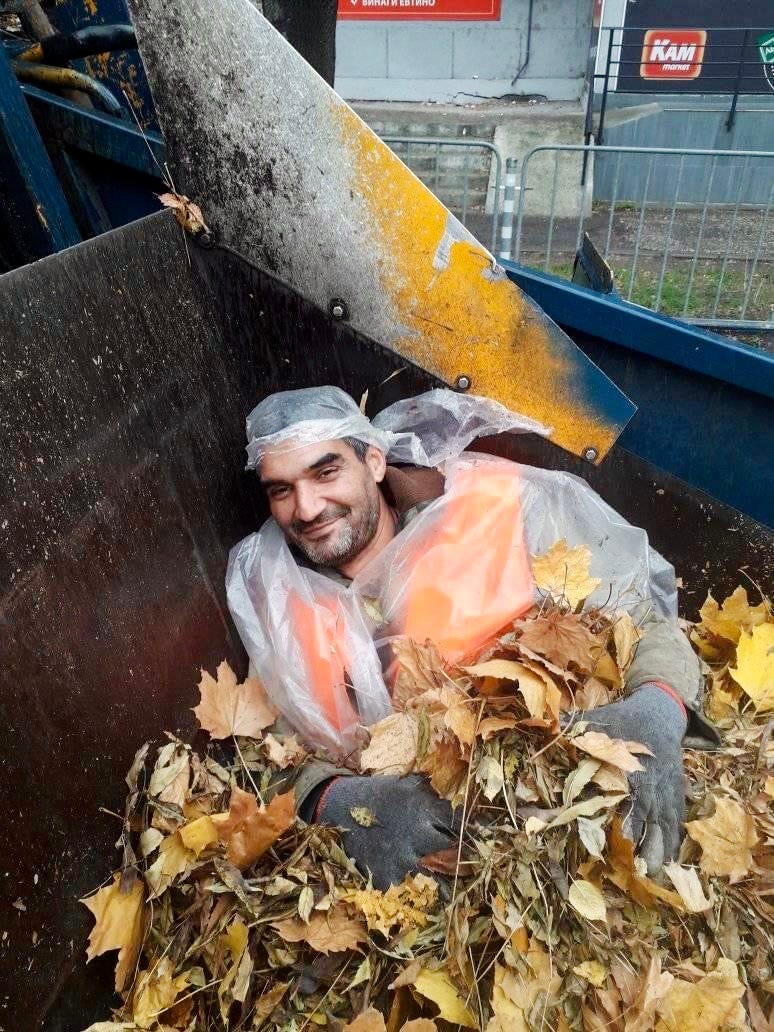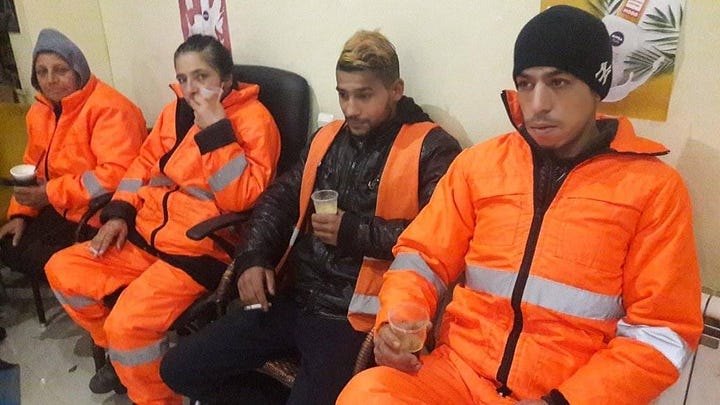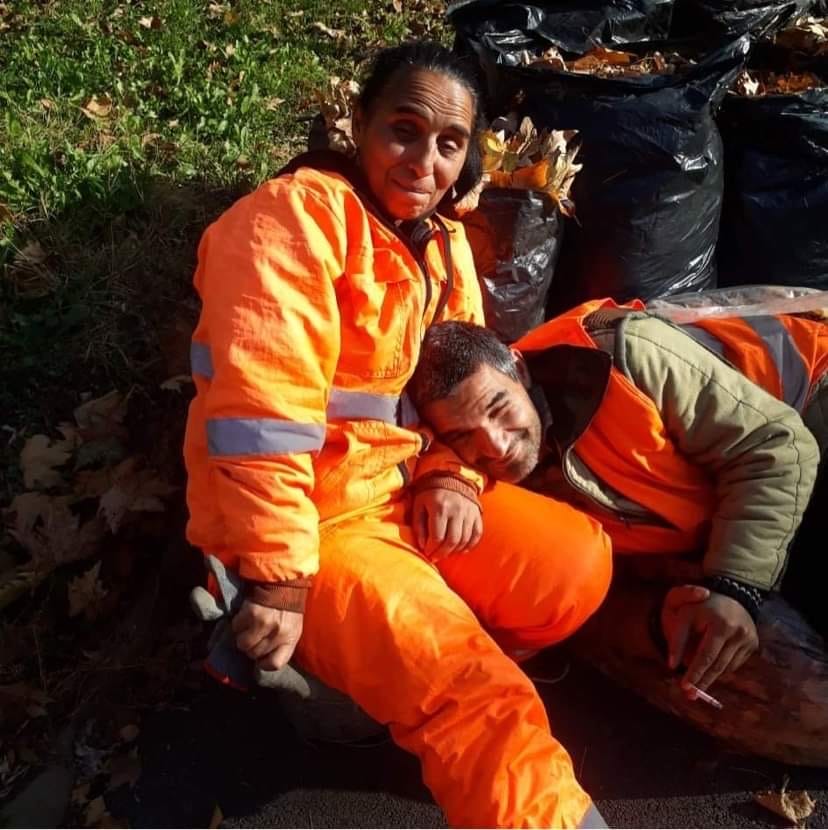The Romani are the first ones notified about snow
A location-specific tale about a racist, labor-exploitative dystopia

One of the biggest, for lack of a better word, culture shocks that Martina experienced when she and Pepi moved in together, came at 3:00 AM on a cold, winter night. It was one of Martina’s introductions to the reality of Romani life, but the actual culture she was about to get to know better was not Roma culture. It was a dark side of our local mainstream culture.
On that cold winter night, Mimi, Pepi’s white ethnic-Bulgarian supervisor at his street-cleaning day job, called and informed him that it was snowing.
Without any further words needing to be exchanged between them, he got up, got dressed, and off he went. Since he was still getting used to the bus schedule in Martina’s neighborhood, he ended up waiting over 90 minutes for the bus. When he finally arrived at work, “so very late” to Mimi’s annoyance, he was still there one hour before the scheduled start of his shift.
Pepi and Mimi have had the same argument countless times since then. “I moved farther away,” he’d tell her, “The first bus is not until 5:00 AM.”
“I don’t care,” she’d answer, “I have to call in every one of you.”
For a while, every time it snowed overnight, Pepi would receive the 3:00 AM call and, unable to go back to sleep, would go watch a movie in the living room until it was time to catch his bus.
“You keep waking me up in the middle of the night to watch television,” he’d tell Mimi.
“I don’t care,” she’d say, “I have to call in every one of you.”
"What kind of weather alerting service is she linked to?” Martina asked Pepi. “How come does she know in the middle of the night that it’s snowing so much that the streets have to be cleaned in the morning?”
“She doesn’t sleep and looks out the window all night,” Pepi said.
It’s not about the missed sleep
Martina’s annoyance with Mimi grew fast. Obviously, the streets have to be cleared of the snow very early so that they’re safe to travel when the city wakes up. However, this extra overtime worked by every single Romani employee does not get compensated, is not regulated, and is not part of any contract or written agreement.
Nobody gets paid extra, nobody gets time off or the option to leave early. Exactly the opposite, people are forced to stay late if the snow keeps falling.
Nobody gets boots, or any kind of protective clothes to keep them warm while they’re shoveling snow from the middle of the night, for hours and hours.
Nobody gets gloves.
Nobody gets anything even remotely waterproof, so people resort to wrapping themselves in plastic bags as protection against the rain and snow.
The bright orange work clothes with neon stripes, mandated across the European Union, are provided - but they are already a few years old, with rips and leaks. The workers mend them themselves.

The expectation is that when Mimi calls, people show up at the office within 30 minutes to receive instructions and then go clean the streets, even though their shifts start at 7:00 AM. The entire tribe lives nearby, so no “excuses” are accepted. Everyone has to get up and walk over. If you’re on one of your 6 days off allotted for the month, you’re still obligated to come in. If you don’t come in, you’re penalized for a “no-show” and an amount twice your daily wage is deducted from your already minimum-wage salary.
And even if you move away, you still get the same call as everyone else and are expected to make your way through a dead city so that you can shovel snow.
After yet another 3:00 AM call last winter, which also woke up our newborn daughter, Martina told Pepi that the next time Mimi calls, she’ll answer instead of him. This amused Pepi but also gave him an extra rush of righteous anger, so he didn’t even go in to work that day and blocked Mimi’s number.
On the following day, back at the office, Pepi and Mimi had another argument over his no-show and the fact that she now can’t reach him by phone.
“You’re getting me in trouble with my wife,” he told Mimi. “She blocked your number.”
Mimi kept demanding that he unblock her, but Pepi kept replying that he was an illiterate Romani and so he didn’t know how.


It’s a game of cat and mouse. The pressure on the workers is enormous. The regard for their wellbeing, safety, and dignity is non-existent. So they sometimes don’t show up for work, or they quit on the spot in a fit of rage.
The always-Bulgarian supervisors see this only as confirmation that the Romani are unreliable and lazy.
When Pepi worked at a different street cleaning company with similar work conditions for a few months this year, his supervisor kept loading him with more and more work while promising that he’ll give him a better position when they hire more people.
One time, Pepi didn’t show up for work and the supervisor called Martina. She explained Pepi was very tired and feeling sick. The supervisor, in a friendly, “just between us” kind of way, told her: “If he wants to support his family, he needs to not be lazy and work. This no-show thing is not serious.”
Meanwhile, Pepi had such pain and exhaustion that he was barely able to hold our 6-months-old daughter for more than a few seconds.
When Pepi reached his breaking point with this place, he did what most of the Romani do. He quit on the spot. Of course, his salary was shorted and he received a laughable sum even though he worked over time, night shifts, and helped them solve a lot of crisis situations as they were perpetually understaffed.
Pepi sent a sarcastic “Thank you for the generous donation” text to his ex-supervisor and received back several paragraphs lecturing him how he’s lazy and not serious and would never be able to hold a job for long. The concluding sentence was “I pity your wife.”
After this fallout, Pepi went back to the other cleaning company and to Mimi for a supervisor.

And it’s not about the snow
Reading this, you’d be forgiven to think that Bulgarians are very scared of snow and our street-cleaning services go in overdrive at the first snowflake that touches pavement.
But no, this madness doesn’t start or end with the snow.
Street cleaning in Bulgaria is done exclusively by the Romani. This is because the job is minimum wage and pure exploitation verging on modern-day slavery due to the complete lack of other professional paths. And the Roma minority has deliberatly been kept in poverty for several generations now, by different political regimes - all of which have introduced their own ways to disenfranchise the Romani more and more.
So, you see bright, skilled people, who once belonged to tribes defined by their ancestral crafts, now being forced to do a job that is dangerous, underpaid, and considered low-class.
When there is a car accident on a busy boulevard, the Roma street cleaners are sent there to clean everything up. When there are strong winds, the Roma street cleaners are sent to schools and daycares to remove debris. When we have elections, the Roma street cleaners are sent to clean every single nook and corner, for presentability. When someone calls with a “signal” that, for example, a tree branch fell on their car or in front of their building, the Roma street cleaners are sent to fix it.
Can you guess how many of these examples are part of a street cleaner’s job description?
Can you guess how much compensation they receive for it - in money, in some other work benefits, in a simple, human thank-you?
The answer to both questions is the same number. Zero.
But this is not where it ends.
When people are resting on weekend mornings, or at night, the Roma street cleaners are sent with malfunctioning blowers and garbage trucks, and then berated, attacked, and threatened for causing noise.
In fact, physical attacks by groups of young men are a very frequent event. The only protection the Romani have is the fact that there are always other members of the tribe nearby and ready to use their brooms and shovels as weapons.
In summer, they get heat strokes because they work, without formal breaks unless they can steal one away, out on the open streets and boulevards under the sun. They sweep streets while trucks and buses are wooshing inches away from their skin.
“Be careful,” Martina said instinctly once to one of the elderly women, as she was stepping onto the boulevard.
“Don’t worry,” she laughed, “Do you think this is our first time?”
Pepi has gotten injured many times at work. One time, he almost poked his eye out. Back home, he sent Mimi a picture of his scar, and she replied: “If you go to the hospital, don’t tell them it happened at work.” Her sole worry was that she might get in trouble.
Earlier this fall, Pepi had a big health scare. He sent Mimi a text message at 1:00 AM saying that we are going to the ER because he is having chest pains. Her response was, “I’m on leave, tell the other supervisor.”
But if you ask Mimi, like any of the other white Bulgarian supervisors at our street cleaning companies, she’s an honest, hard-working woman. She even works well with the Romani - in fact, she has worked with them her whole life. She knows them. And oh, do they drive her crazy. But she knows how to get the job done, even when they are lazy and unreliable.




